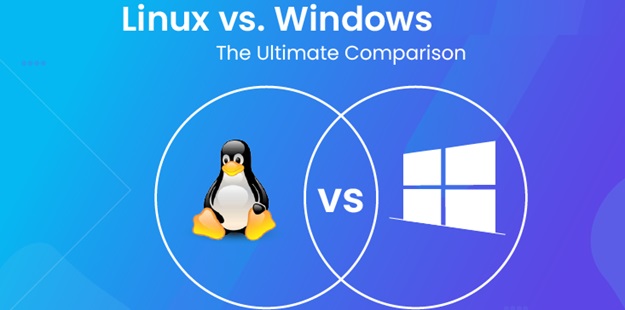When it comes to creating a website/blog for your online business or content, or when you want to practise running your own servers on the net, you need to answer a very essential question. Is it good to run a server or Windows or Linux?
Most of the web hosting platforms would have you start on a Linux server, however, if you wish to get your hands on a Windows server, you should opt for a relevant hosting service. In this article, we have discussed some of the important points of difference between the two operating systems so that it becomes simpler for you when you’re about to opt for the web hosting service of your choice.
Linux VS Windows: The Important Points of Difference
This article is going to break down the important points of difference between Linux and Windows operating systems as hosting servers, and give you the necessary information that’ll simplify your process of choosing the right website hosting provider that caters to your needs and requirements.
Technology
As far as the differences between Linux and Windows hosting in today’s world are concerned, technology is the most important factor separating the two. Linux makes use of custom software and supports most of the programming languages, whereas on the other hand, Windows makes use of specific Microsoft software to manage and run data and information.
Linux works on MySQL, whereas Windows servers make use of MSSQL. Furthermore, Windows hosting uses Microsoft ASP.NET as the primary programming language. These are not really very widespread technologies, and as a result, most beginner programmers would be required to invest a considerable amount of time in order to master them.
In most cases, Linux should cater to your needs just fine. MySQL is highly famous data management system software, and it comes with plenty of supportive applications as well. It supports Python, PHP, and Perl among other things, thereby making it accessible to developers of various backgrounds.
On the other hand, if you’re looking for a job in a large corporation that makes use of Windows Server Datacenter and MSSQL to develop proprietary services, Windows hosting might be the way to go.
Also, if you think that you may need to handle legacy projects from top businesses as a part of your job, or if you need ASP.NET or MSSQL to run applications on your website or for your future employment, then Windows is the better alternative to the two.
Customizability
For beginners, if you own a server, you can install every Linux distro there. However, with Windows, you can only get your hands on a licensed version of Windows Server Datacenter. If you are proficient in configuring Linux distributions, there is an excellent chance for you to add interest and functionality to your server.
There’s this layer of easier customizability when it comes to Linux hosting. Most of the popular website-building platforms, like Drupal, WordPress, and Joomla, are all built for Linux servers. They can be made to work on Windows servers, too, but it would require a bit of tinkering to achieve this!
Furthermore, most open-source applications that can help you customize a server or a website may not support ASP.NET, hence making Linux a better option.
Licensing and cost
Windows is sold by Microsoft, a for-profit company, whereas Linux, from the house of Unix, is an open-source server to host websites/blogs. This implies that web hosting firms using Windows servers must purchase a license. Windows hosting is somewhat more costly than Linux hosting as the hosting business passes that cost on to you.
Linux is an open-source web hosting server, and it is free to use. You are only required to pay for the hardware and the services when you opt for Linux hosting. This isn’t the case with Windows hosting.
For every individual who’s unfamiliar with how hosting works, you can’t really run a server on the free Windows 10. You are required to obtain a Windows Server Datacenter license for that.
Having said that, there is not a significant pricing difference between Linux and Windows hosting. For good Linux hosting, you could expect to spend no more than $2 a month. However, you will need to pay $4 a month for Windows hosting.
Popularity
When the talk of the hour is popularity, then Unix is the supreme leader. As of 2020, more than 71% of all websites on the internet ran on a Unix server. Linux, being an open-source version of Unix, is used by almost 43% of all the websites that make use of Unix. One of the most popular Linux distributions powers 33% of all websites, whereas other Unix systems like Darwin, Solaris, Minix, and BSD only host 0.1% of all websites.
Windows is only used by 28% of the websites available on the internet. Windows as a server is mainly used by large corporations with websites that receive high traffic. Linux, however, isn’t that far behind. Some of the biggest applications, like Wikipedia, run on it.
It’s easy to make an individual’s website on a Linux server by just coming up with a name, using WordPress to construct a website or blog, and posting it. Naturally, a large number of people have done it, resulting in quite a few websites being hosted on Linux. Even if you don’t host a website on WordPress directly, the cPanel of Linux is a very intuitive piece of software in itself.
File names
Another difference between Linux and Windows hosting is that Linux files are case-sensitive, whereas Windows files are not.
For instance, on a Linux server, Home.html and home.html are two different names.
However, on a Windows server, Home.html, home.html and HOME.HTML are all the same names.
Server Security

Although there’s this notion amongst people that Linux is more secure than Windows, both of these operating systems are equally secure. Security primarily depends on the server setup and the administrators that run the server.
Control panels
Window hosting and Linux hosting make use of different control panels. The cPanel is accessible on hosting platforms (Linux based), such as reseller, Linux shared, Linux dedicated, and VPS hosting services. This control panel is largely considered to be an industry standard.
On the other hand, Plesk is available on Windows-based website/blog hosting platforms.
Final Words
If you’re a developer, particularly if you come from a business background, it would be more sensible to host your website on a Windows server. Since most large companies utilize this for internal servers, you’re probably used to it as well.
On the other hand, if you’re not a developer, you should always go for Linux. The cPanel will cover most of your needs, and additionally, you will have easy-to-learn customizing options at your disposal.
Also, if your main language is Python, PHP, or Perl, you’re going to be better off using Linux as your hosting server. The same is also true for technologies like MySQL, NGINX, and Apache. However, if you’re more used to running a server on MSSQL or already familiar with the ASP.NET stack, you should go for Windows hosting.
